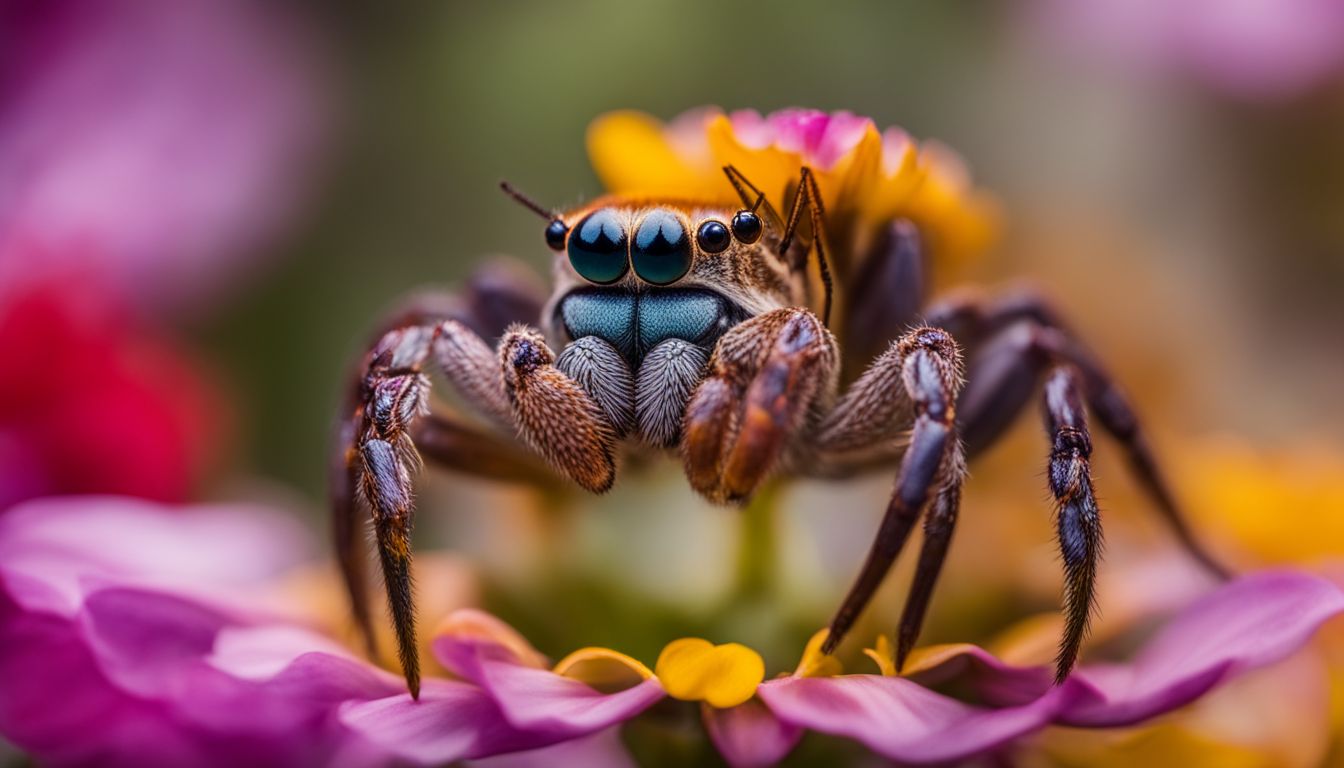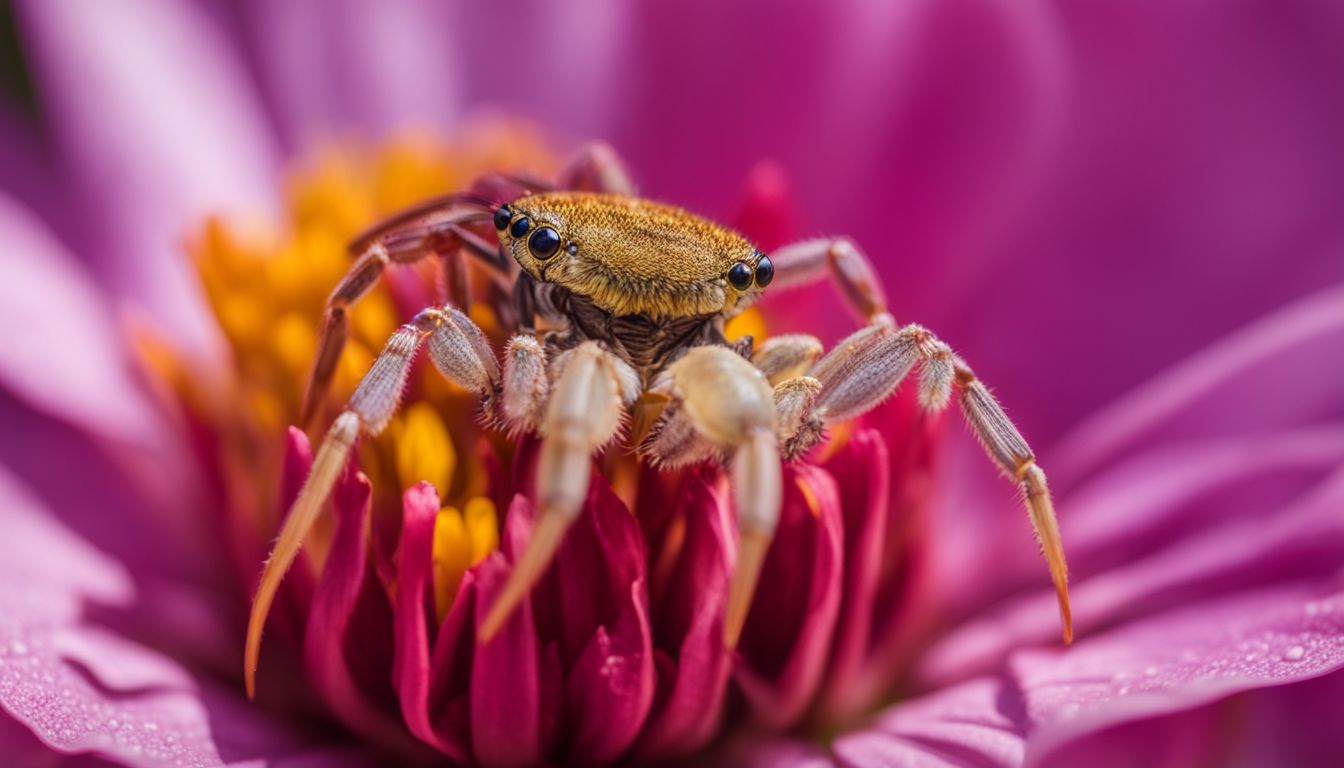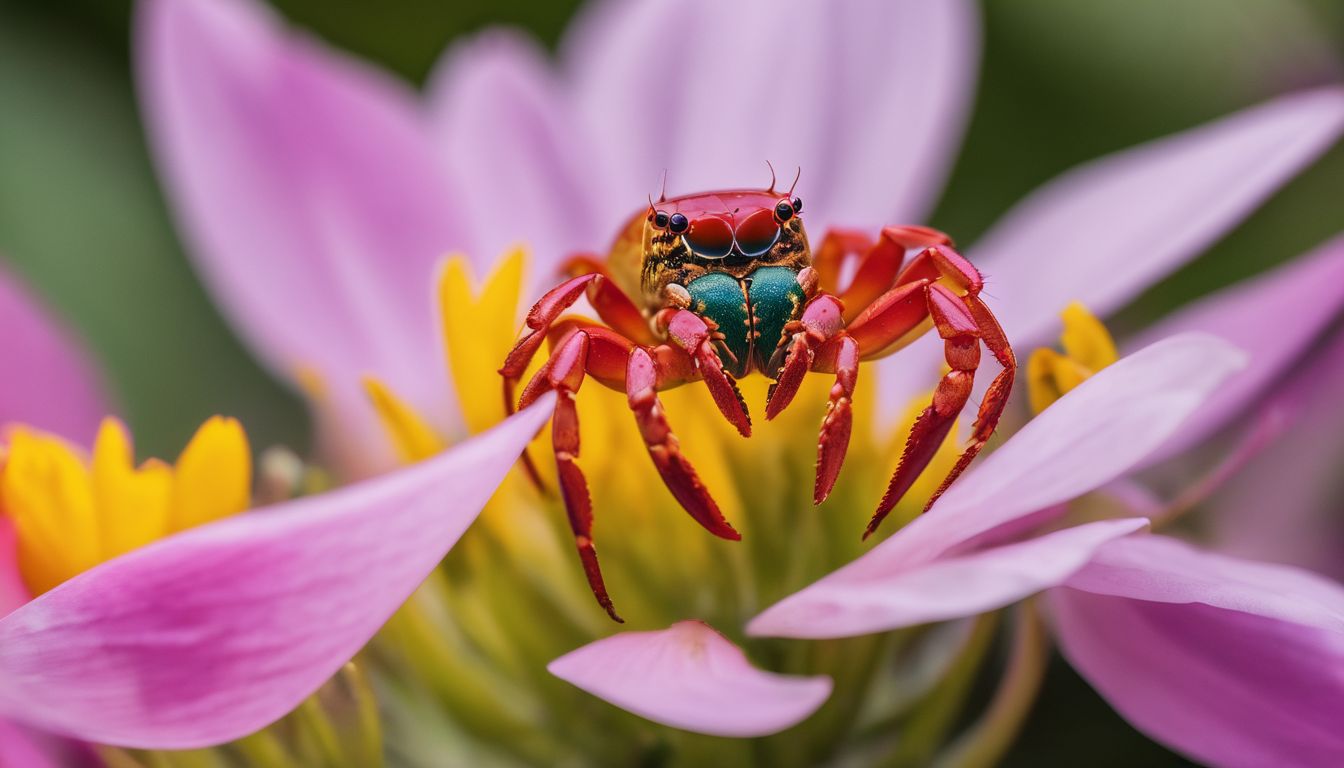Are you worried about those creepy crawlers with sideways scuttles giving you a nasty bite? Crab spiders are fascinating critters, known for their unique hunting style and vivid camouflage.
This blog post will delve into the biting habits of crab spiders, what to do if you’re bitten, and simple ways to prevent run-ins with these eight-legged hunters. Keep reading – it’s not as scary as it seems!
Key Takeaways
- Crab spiders can bite, but their bites are not harmful to humans or pets due to their weak venom.
- If bitten by a crab spider, clean the area with soap and water, apply an ice pack to reduce swelling, and seek medical attention if symptoms like nausea or dizziness occur.
- To prevent encounters with crab spiders, keep living spaces tidy, seal entry points, and be cautious around plants and flowers where these spiders may hide.
Understanding Crab Spider Characteristics

Crab spiders are known for their unique appearance and habitats, often found in flowers or on plants. These passive hunters use their color variation to blend in with their surroundings and ambush their prey.
Appearance
Crab spiders have a unique look. Their four front legs are longer and thicker, just like a crab’s claws. These legs let them grab prey quickly. They move sideways, too, which makes them even more like crabs.
You can find these spiders in many colors and shapes. Some have short, round bodies while others are long-legged and thin. Their color variation helps them to hide from both insect prey and humans.
This way, they can ambush their prey better without being spotted easily.
Habitats
Crab spiders have a special way of living. They make their homes in places like flowers, green leaves, or dead leaves on the ground. These spiders are great at hiding. They can look like other things, such as ants or even bird poop! This trick helps them catch bugs to eat without being seen.
They do not build webs to trap insects. Instead, they wait quietly and grab their prey with quick moves. Now let’s learn about what happens if one bites you or your pets.
The Nature of Crab Spider Bites

Crab spiders are venomous, but their bites are not considered harmful to humans and pets. However, the potential for bites still exists, so it’s important to understand how to identify and treat them if they occur.
Are Crab Spiders Venomous?
Yes, crab spiders are venomous. Their venom is made to quickly stop bees and other small insects they eat. For people and pets, though, this venom is not harmful. You might feel a sting if bitten by a giant crab spider but you don’t need to worry about the poison hurting you.
Crab spiders use their mouthparts to bite and shoot venom into their prey. This helps them catch food much bigger than themselves. But when it comes to humans, these bites are mostly just annoying rather than dangerous.
The little amount of venom they have doesn’t do much harm to our big bodies.
Potential for Bites on Humans and Pets
Crab spiders generally do not pose a significant threat to humans or pets. Their bites are usually too small to break the skin, so they may not even be noticed. The venom of crab spiders is not harmful or toxic.
Therefore, the risk of serious effects from their bites is unlikely for both humans and pets. However, children should be cautious when playing in old, unused buildings where crab spiders might reside.
This precaution can help minimize the risk of potential encounters with these spiders.
Treating Crab Spider Bites
If you or a pet is bitten by a crab spider, it’s important to clean the area with soap and water, apply an ice pack to reduce swelling, and seek medical attention if symptoms like nausea or dizziness occur.
Remember, prompt treatment can help minimize the effects of a crab spider bite.
First Aid for Bites
When bitten by a crab spider, you can take the following steps for first aid:
- Apply an ice pack or cold compress to the bite to reduce swelling and discomfort.
- Clean the bite area with soap and water to prevent infection.
- Use a sterile bandage to cover the bite if it’s an open wound.
- Seek medical attention if there are signs of an allergic reaction or if the bite becomes increasingly painful.
When to Seek Medical Attention
After providing first aid for crab spider bites, it’s important to be aware of when to seek medical attention. Although crab spiders are usually not harmful to humans due to their small size and weak venom, it’s crucial to monitor the bite area for any signs of infection or allergic reaction.
In case you experience symptoms such as severe pain, swelling, redness spreading from the bite, muscle spasms, breathing difficulties, or a rapid heartbeat after being bitten by any spider – seek immediate medical help as these could indicate a more serious issue that needs professional attention.
It’s also essential to remember that certain species of spiders like the black widow or brown recluse can cause severe illness or death with their bites, so seeking prompt medical care is critical if you suspect you’ve been bitten by one of these venomous spiders.
Preventing Crab Spider Encounters
To prevent crab spider encounters, it’s important to keep your home and outdoor spaces tidy and clutter-free. Make sure to seal any cracks or entry points to keep them from entering your living areas.
Tips for Control and Prevention
To keep crab spiders away:
- Install tight – fitting screens on windows and doors to prevent entry.
- Seal cracks and crevices in walls, floors, and foundations where spiders can enter your home.
- Use yellow or sodium vapor light bulbs for outdoor lighting, as they are less attractive to insects and thus fewer spiders.
- Keep the area around your house free of debris, woodpiles, and other clutter where spiders can hide.
- Regularly vacuum floors, corners, and crevices to remove spiders and their webs.
What to Do If You Find a Crab Spider
If you happen to come across a crab spider, it’s important to handle the situation carefully. Here are some guidelines on what to do if you find a crab spider:
- Stay calm and avoid panicking.
- Use a cup and piece of paper to gently capture and release the spider outside.
- If touching the spider is not an option, use a vacuum cleaner to remove it.
- Keep your living space tidy to discourage spiders from nesting indoors.
- Consider sealing cracks and crevices in walls and floors to prevent entry.
Conclusion
In conclusion, crab spiders can bite, but their venom is not harmful to humans. If bitten, clean the area and watch for any allergic reactions. To prevent encounters, be cautious around plants and flowers where crab spiders may hide.
Overall, while they may bite if provoked, crab spiders pose little threat to people.
To learn more about the diverse diet of their arachnid cousins, explore our in-depth guide on what jumping spiders eat.
FAQs
1. Do crab spiders bite people?
Yes, crab spiders can bite people if they feel trapped or scared. But their venom is not harmful to humans.
2. Are baby crab spider bites different from adult bites?
Baby crab spiders, called spiderlings, are too small to bite people. They focus on growing and staying safe near their egg sacs.
3. What should I look for if I think a crab spider bit me?
If you think a crab spider has bitten you, check your skin for a small red mark. It might itch or hurt a little bit but won’t be serious.
4. Can pest control help with crab spiders in my home?
Pest control can help keep crab spiders away from your home by finding and removing egg sacs and the places where they like to hide.




